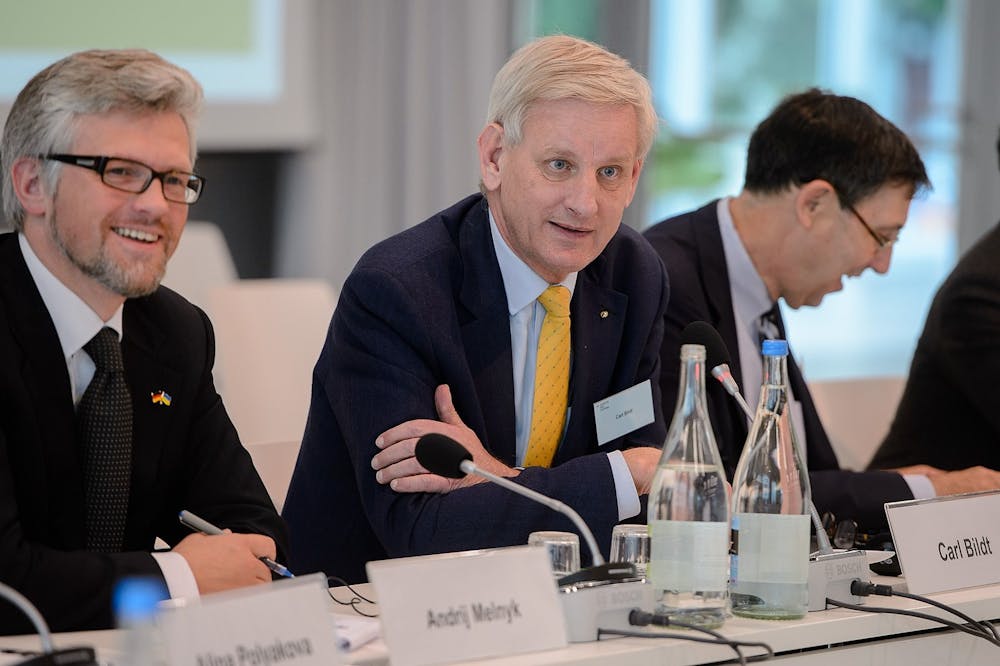
Former Swedish Prime Minister Carl Bildt (center) next to the Ukrainian Ambassador to Germany Andriy Melnyk on Nov. 18, 2015 (Photo by Stephan Röhl | CC BY-SA 2.0).
The Perry World House hosted former Prime Minister of Sweden Carl Bildt on March 14 for a discussion on the recent Russian invasion of Ukraine.
Bildt, who led the nation of Sweden in joining the European Union and reforming the Swedish economy, spoke to the audience about the historical conflict between Russia and Ukraine. The event then continued with a conversation between Bildt and New York Times Editor Clay Risen, and concluded with questions from attendees — both in person and on Zoom.
Interim President Wendell Pritchett introduced Bildt and welcomed a full audience back to the Perry World House, which had previously limited attendance for its events for two years because of the COVID-19 pandemic.
Bildt spoke to the audience about the history of Russian international relations — from the First World War to Vladimir Putin’s rise to power — explaining how "Europe will never be the same" as a result of the current crisis.
Bildt emphasized that while there is a lot of uncertainty in this war, “It is certain that Vladimir Putin can’t win.”
He said that “even in the best of military scenarios for Putin, he will incur major costs." Bildt hypothesized about the war's impending result, stating that he expects Russia to struggle economically for decades, and that Putin will be treated "as a pariah."
Risen posed questions to Bildt about Putin’s mindset in inciting the conflict, the involvement of China, European countries, and the United States, the implications of this war for the EU, and how sanctions could target Putin rather than the greater Russian population.
Putin has been facing a lot of resistance in Ukraine, Bildt said.
There have also been forms of resistance across the world in support of Ukraine, including in Philadelphia. Hundreds of protesters gathered at City Hall on Feb. 25 to call on the United States to impose harsher sanctions against Russia and increase military assistance of Ukraine.
Bildt added that he believes Putin is mistakenly focusing on the past history of Russia rather than its future.
“Putin is deeply embedded in creating this 19th-century empire. He sees Russia losing things in areas that are central to this empire. And that is an obsession,” Bildt said.
Bildt also added that he anticipates private businesses leaving Russia will impact the economy, using IKEA as a case study. IKEA came to Russia decades ago, he said, indicating a shift in the nature of the country to become more westernized and move forward. IKEA is now temporarily pausing operations in Russia, which he said was a sign that Russia is now moving backward.
Bildt said that while he believes there will be "tragic weeks" ahead as the situation in Ukraine unfolds, he ended the event on a more hopeful note, sharing that he believes the future in the West may not be as bleak as it looks right now.
“The future in the West doesn’t look that bad after all," Bildt said.
The Daily Pennsylvanian is an independent, student-run newspaper. Please consider making a donation to support the coverage that shapes the University. Your generosity ensures a future of strong journalism at Penn.
Donate






